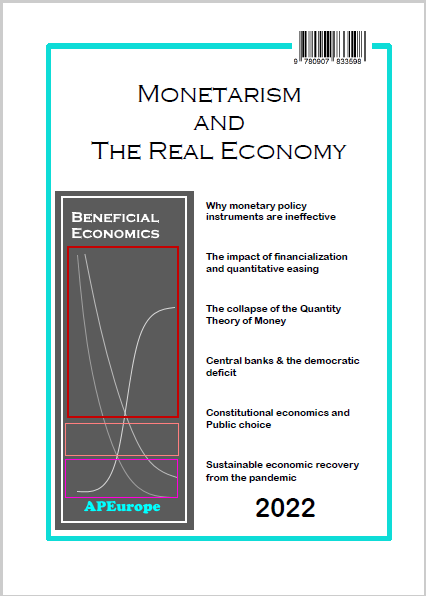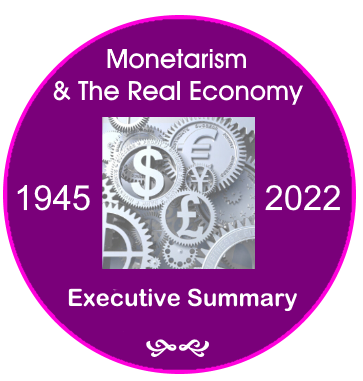Back to the BENECON home page
 BENECON 2022 New publication BENECON is pleased to announce the release of BENECON 2022 with the title of: Monetarism & The Real Economy This document was accepted to make up a whole edition of the Q1-2022, British Strategic Review with the title of, Monetarism and The Real Economy A free Executive Summary is now available, see below. A general update of this publication and list of contents can be found on the BSR site. The first overview by the economist Nevit Turk can be found here on the Hambrook Publishing Co site. In this edition of the BSR the following significant economic issues are presented:
How to obtain a copy A free epub or pdf executive summary of the BSR is available for download below. Some browsers do not handle epub downloads well so we have zipped the epub to protect it. Therefore the available epub is in a Zip file which needs to be unzipped when downloaded. The full BSR document in epub or pdf formats can be purchased, for just £10.oo a copy. At the moment a technical issue associated with card payments is being resolved with PayPal and we will post this facility when this issues is resolved.
2022 Monetarism & The Real Economy - an overview"Release date: January, 2022. Introduction BENECON 2022 is in an unusual strategic document because it introduces a range of facts and concepts which have not previously appeared in a single text related to monetarism or to the real economy. The real economy relates to the supply side production of goods and services employing around 98% of the working population as wage-earners. Nevit Turk is an economist and the APEurope correspondent with the most experience in dealing with the subject matter covered in BENECON 2022. Nevit has also interviewed the author of the BENECON 2022 on related topics on several occasions. APEurope Correspondent's Pool asked Nevit to provide his overview of this important publication. John Penrose ACP
by Nevit Turk Economic Correspondent Agence Presse Européenne Paris. BENECON 2022 is unlike any other strategy document I have read during the last 30 years. It is unique in that it not only describes how monetarism came to dominate macroeconomic policy but it also traces how some of the events that caused this transition in the 1970s have persisted. This is because the root causes, linked to faulty economic theory, derived policies and inappropriate political decisions helped maintain the problem of energy dependence and income disparity as permanent unresolved issues over the last 50 years. The document has 10 sections covering different time periods since the Great Depression following the 1929 New York Stock Exchange crash. It is not possible to touch on the considerable amount of original material and revelations in this document so I have limited this overview to the main points of interest but remain aware that it is difficult in the space available to do this work justice. In the section entitled,"Further turmoil and the turning of the tide in the 1970s" there were rising concerns with the global ecosystem, population pressure on food supplies and the limits of growth centred around Cambridge, Stanford and MIT but these were pushed to one side as a result of the International Monetary Fund's actions that enabled Arab oil exporters maintain a strategy of price rises designed to punish those who supported Israel in the wars in the Middle East. This led to a seven-fold price increase in petroleum prices within just a decade, starting in 1973. The IMF came up with the idea of recycling petrodollars as a useful buffer to discourage a possible military responses to this globally destabilizing action. Access to these funds were extended through the IMF and from private banks to military hardware corporations and to politicians and political party coffers in the West. The petroleum price was more of an issue of the cost of living to wage-earners but not to those benefiting from the proceeds of recycling and those deciding on macroeconomic policies.
An interesting detail was the fact that two distinct policy options were developed to tackle slumpflation starting our around 1975. One was Supply Side Economics (SSE) and the other was the Real Incomes Approach to Economics otherwise known as Real Incomes Policy (RIP). Although SSE was taken up by the US Reagan administration, it was simply a fiscal scheme involving reductions in marginal taxation in the hope that the windfall funds would result in higher investment in price-reducing initiatives. This "trickle down" notion did not work out in practice because much of the windfall went into executive and shareholder's pockets and assets. Income disparity rose. The Thatcher government tried the same thing. Inflation did fall slightly, but this was a direct result of a decline in the international price of petroleum in the years concerned while income disparity rose. RIP was developed by the Hector McNeill, the author of BENECON 2022. This is completely supply side, and its theory is quite different from the Aggregate Demand Model (ADM) the paradigm of Keynesianism, monetarism and SSE. I interviewed McNeill in about seven years ago when he explained that in 1975 he had attempted to write a proposal to tackle slumpflation but could not find a solution applying any of the conventional policy instruments (interest rates, taxation, monetary volume controls and government loans and directed investment) he realized that all of them, if applied, would create severe prejudice for constituents. Having received his economics training at the Universities of Cambridge and Stanford, McNeill found this state of affairs to be unacceptable. He therefore started from scratch to identify the logical mechanisms that create slumpflation in order to identify the theory behind the mechanism. He then used this to design a policy able to resolve the particular issue of tackling inflation by means that do not prejudice constituents and, in particular, wage-earners.
The House of Lords Economic Affairs Committee evidence on QE gathered during 2021 resulted in a report entitled, "Quantitative Easing: A dangerous addiction?. BENECON 2022 points out that some of the evidence presented to the Economic Affairs Committee, referred to QE as, "...a policy without a theory". The document confirms this by presenting a step-by-step demolition of monetary theory in the form of the QTM and to present a substitute in the form of the Real Theory of Money as a more complete and more useful identity. By the same stoke, this demonstrates why the QTM is of no utility. The document calls upon past advocates of an alternative theory to the aggregate demand model in the form of the French Economist, Jean-Baptiste Say (1767–1832) and Nicholas Kaldor (1908-1986) who became the Professor of Economics at the University of Cambridge when McNeill was a student there. What brings these, apparently, unrelated economists together is based on the contributions of these economists to the basic theory of RIP in the form of the Production, Accessibility and Consumption model. First of all Say in his treatise, subtitled, "The Production, Distribution and Consumption of Wealth", published in 1803, emphasized the importance of the role of entrepreneurs in bringing about more efficient ways to deploy resources through innovation. In 1819 Say took up the chair of industrial economy founded for him at the Conservatoire des Arts et Métiers. It is this that links him to Nicholas Kaldor who was one of the first economists to introduce the impact of technology and changes in technology in models of the economy. In 1975, Denis Healey the Chancellor of the Exchequer (Minister of Finance) under a Labour government, abandoned Keynesianism and a wages policy and introduced a crude form of monetarism whose conditions were intensified under the terms of an IMF loan. Kaldor, who had advocated a proactive industrial policy, resigned from his position as an adviser to the Labour government in 1976 to became one of the strongest and most consistent critics of monetarism during the beginning of the Thatcher government. Kaldor's predictions that the impact of monetarism would be a hollowing out of British industry and manufacturing, declines in productivity, rising income disparity and unemployment, and a falling balance of payments under the yoke of monetarism, all turned out to be correct. Based on the general analyses covering all of the above, the document then summaries the overall impact of monetarism in the form of a serious constitutional issue that has arisen and made more apparent under QE. This is that monetarism has created two distinct sets of constituents.
The document explains how the recent inflation affecting the UK economy is not just related to supply chain issue or Covid but the mechanism whereby monetarism generates inflation in the goods and services sectors, which always seemed to elude monetarist advocates, is spelt out in very clear terms; the current rise in the cost of living is a direct consequence of monetarism. The penultimate section homes in on a central issue facing the United Kingdom. Germany, which exists in roughly the same geographic zone of Europe has developed since 1945, reunified with difficulty with East Germany to end up with the largest positive balance of payments in the world consisting of exports of goods or largely industrial products. Germany's balance of payments is larger than that of China a county with over 16 times the population of Germany. On the other hand BREXIT Britain's performance under a continued monetarism presents a sorry state of affairs placing the country as the second to last most negative balance of payments in the world and importing most manufactured goods. This decline over the last 50 years accompanied "free trade globalization" which created depressed rust zones in the UK, today encompassing most of the so-called "Red Wall" areas which were never fully integrated into British economic development and fell behind. The main point is whereas Germany invested in tacit and explicit knowledge-based education and training the UK continued with a highly academic schooling both in pubic and private systems and higher education training system. Monetarism's policy impacts as the deskilling of the British work force has been a disaster. The document calls attention to how, at school age level, there is a need to introduce a broader technical education in the UK and to move away from "chalk and talk" or "white boards and chat" and even "Zoom". The final section spells out an approach to initiate the resolution of some of the issues facing the UK economy and society as a whole. Avoiding the clichés of building back better and levelling up, the document, sets out convincing arguments in support of the role of learning, tacit and explicit knowledge. The monetarist theory is convincingly debunked in the document. The outcome, in terms of policy has become self-evident for the majority of constituents. The vital role of innovation, takes the microeconomic mechanisms that can transform productivity to identify incentives, based on business rules, to lower the risk of investment and eliminate inflation. This dynamic can deliver real incomes growth and falling incomes disparity. Options around a central theme are provided. In the final section the quandary of how to bring all of this about identifies problems associated with our political party system but pointers to solutions are presented. The document recalls the outstanding Power Report of 2006 as a demonstration of the resistance to electoral reform by both of the leading political parties. There is, fundamentally a strong resistance to arriving at a state where the constituents of the country contribute, in a practical fashion, to the shaping of policies that impact their livelihood and wellbeing. There is also the problem that neither of the main political parties offer alternative economic policies. In this context the document lays bare the fact that both Labour and Conservative parties have both been relentless in their pursuit of monetarism without interruption for since 1975 and Denis Healey's fateful decision to embark on this journey. This was more as a result of panic because the Treasury had over-estimated the government borrowing requirement causing Healey to go to the IMF. There was here a lack of due diligence to double check this estimate on his part as well as an unwillingness to take notice of what Nicholas Kaldor has to say on the matter. Neither Labour of Conservative governments come off well in this document simply because, to this day, they have both pursued the same monetarist paradigm and therefore aside from rhetoric, they have not offered fundamental alternatives for the people of this country. Until one of them understands that there is an alternative that holds out promise, the country is likely to continue its descent as is the norm at the end of all hegemonic cycles. This is a timely document that provokes second looks at how we have managed our affairs in Britain and it provides insights into economics of relevance to economies beyond these isles who, like Britain, need better pathways towards sustainable development. |




